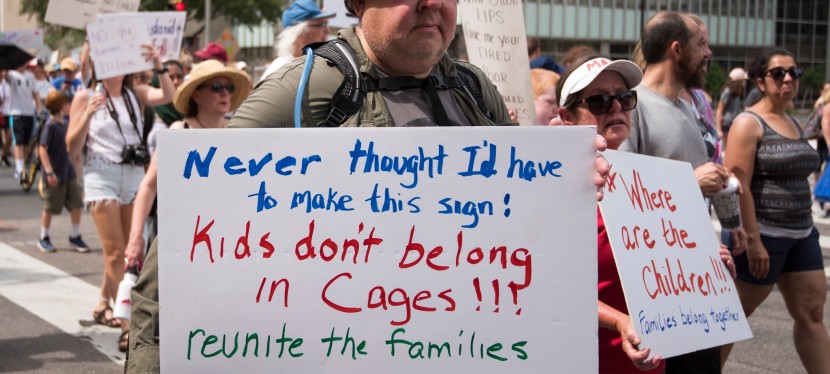By Mark Peters
Director of Justice, Peace and Reconciliation, Priests of the Sacred Heart
The August 25 Washington Post ran a story about the South Texas Family Residential Center in Dilley, Texas, the largest of three in the U.S. specifically dedicated to the holding of mothers and children. Opened to reporters for the first time, the center was described by reporter Maria Sachetti as clean and well-equipped, very different from the images we’ve all seen of kids in pens at the border.
I can confirm her story – I was there two weeks earlier and saw everything she described:
…a dental office, with a reclining chair and sterile instruments… cafeteria serving hot dogs, lime-cilantro chicken, tortillas and green salad — all you can eat… Kindergartners [singing] “If You’re Happy and You Know It…” access to a wide array of services, including a 24-hour infirmary, a day care, a library with Internet and email access, a beauty salon, a charter school and a canteen.
I’d been asked by SGI to take part in a tour of the Dilley facility and sit in on a dialogue of ICCR members with CoreCivic, the private corporation that runs Dilley and is one of the “big two” in that field, along with GEO Group. At one time they were in dialogue with GEO, but the company had “paused” that conversation. (In fact the CEO had suggested they sell their shares and leave them alone!

CoreCivic has been a more willing partner, and after the dialogue I sat in on later that afternoon after the tour of the detention facility, the ICCR delegation saw signs for hope that human rights were getting needed attention. But one has to wonder what an organization like Catholic Charities could do with the money CC is getting to run this camp, whether it’s full or not (surprisingly it never has been and often is way under its 2400 bed capacity). The director told us he had “no idea” how Customs and Border Patrol and ICE decide who to send and not – mothers have reported an almost “eenie-meenie-minee-moe” approach at the border.
The Post reporter’s story is excellent in my opinion, and I encourage you to read it. I especially call attention to her explanation of the Flores Agreement and the impact the Administration’s plan to nullify it would have on the length of time families are forced to stay in these camps (in a “vast stretch of scrubland in a tiny former oil-boom town, an hour south of San Antonio”), where the temperatures are often above 100 degrees and people generally don’t leave their air-conditioned pods.
The women who’ve left and were interviewed by Sachetti all agreed that, while “far better than the Border Patrol holding cells or the safe houses they stayed in during their trip through Mexico,” they still considered Dilley a jail. Most currently stay less than the 20 day Flores limit, but if Flores is negated stays are expected to go to 3 times that and could legally be unlimited. What will it do to the admittedly good morale (for the circumstances and relative to the trauma they’ve just passed through) we witnessed if that becomes the case. We need to be telling Congress to keep the Flores Agreement!
I and the others were very surprised by what we saw in Dilley and relieved to know that not every detention facility is as bad as the worst of them (I can only vouch for this one, but I would also have to say that we all felt it was not “staged,” that we were seeing normal life there). The next day, we heard a group that provides pro bono legal services say that residents were not being allowed to see them without an appointment, which should be their right, but we weren’t able to ask the CoreCivic official about that. Follow-up is planned. I’m grateful to SGI and ICCR for the opportunity to participate in this visit and commend the dialogue team for their dogged efforts to ensure that human rights are not trampled. Perhaps what we saw would not have been that way without the efforts of them and so many others to let government and business know we are watching.


